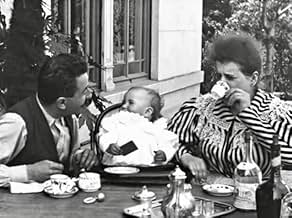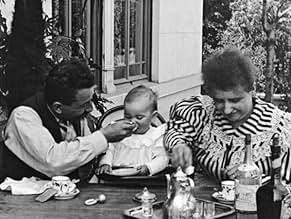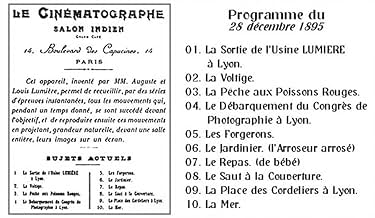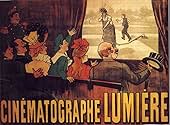PUNTUACIÓN EN IMDb
5,9/10
3,7 mil
TU PUNTUACIÓN
En el marco de una primera proyección pública en el Salon Indien, el 28 de diciembre, en París, Auguste Lumière hace girar el centro de atención en torno a su hija pequeña, mientras intenta ... Leer todoEn el marco de una primera proyección pública en el Salon Indien, el 28 de diciembre, en París, Auguste Lumière hace girar el centro de atención en torno a su hija pequeña, mientras intenta alimentarla con una cuchara.En el marco de una primera proyección pública en el Salon Indien, el 28 de diciembre, en París, Auguste Lumière hace girar el centro de atención en torno a su hija pequeña, mientras intenta alimentarla con una cuchara.
- Dirección
- Reparto principal
Reseñas destacadas
I watched this film on a DVD that was rammed with short films from the period. I didn't watch all of them as the main problem with these type of things that their value is more in their historical novelty value rather than entertainment. So to watch them you do need to be put in the correct context so that you can keep this in mind and not watch it with modern eyes. With the Primitives & Pioneers DVD collection though you get nothing to help you out, literally the films are played one after the other (the main menu option is "play all") for several hours. With this it is hard to understand their relevance and as an educational tool it falls down as it leaves the viewer to fend for themselves, which I'm sure is fine for some viewers but certainly not the majority. What it means is that the DVD saves you searching the web for the films individually by putting them all in one place but that's about it.
Anyway onto this film which is barely even a minute long and focuses on two parents feeding their baby. It is an affectionate and tender shot that is free of anything of particular interest but is still quite engaging. Clearly made as part of the developmental process of getting to grips with the technology, the film doesn't aim for much but in regards its place in history it is maybe worth a look at. Lumière is considered the originator of cinema, so on that basis alone it is worth a glance. Don't expect to be able to understand the impact of the film though to those of us now used to seeing different universes on our screens when we go to the cinema, it is difficult to forget that you'll looking at two people feeding a baby!
Anyway onto this film which is barely even a minute long and focuses on two parents feeding their baby. It is an affectionate and tender shot that is free of anything of particular interest but is still quite engaging. Clearly made as part of the developmental process of getting to grips with the technology, the film doesn't aim for much but in regards its place in history it is maybe worth a look at. Lumière is considered the originator of cinema, so on that basis alone it is worth a glance. Don't expect to be able to understand the impact of the film though to those of us now used to seeing different universes on our screens when we go to the cinema, it is difficult to forget that you'll looking at two people feeding a baby!
A father with his wife at the table feeds his son , who then offers a cookie to his parents while the wind moves the trees. There is a time when children will have to feed their aged parents and already before time this child offers them food!
One of the first films ever made, the film seems extremely primitive: there is no dialogue or plot or characters. However, in 1895, it was a new technological breakthrough. It is interesting to watch; the Lumière brothers were the first film makers and pretty much invented the technology, along with Edison.
Repas de bebe (1895)
This early film from Louis Lumiere is pretty simple as a mom and dad are facing the camera with their child sitting between them. They feed the baby. Yep, that's all that happens in this early film but it's a pretty interesting experiment. Of course, this was 1895 so it's silly to try and compare this film to the film's of today. Things were so early at this point that people like Lumiere were just filming whatever they could. If you've got children then this here will obviously appeal to you as it's quite funny to see the baby's reaction to all this food coming its way.
This early film from Louis Lumiere is pretty simple as a mom and dad are facing the camera with their child sitting between them. They feed the baby. Yep, that's all that happens in this early film but it's a pretty interesting experiment. Of course, this was 1895 so it's silly to try and compare this film to the film's of today. Things were so early at this point that people like Lumiere were just filming whatever they could. If you've got children then this here will obviously appeal to you as it's quite funny to see the baby's reaction to all this food coming its way.
Two loving parents feed their happy baby on the perch of their country home. It is often said that these early Lumiere shorts are primitive because they have not yet mastered basic film grammar, such as camera movement, editing or the close-up, films like these being a simple, static set-u;, the camera pointing at the scene from a middle distance. But as filmmakers like Godard, Ozu and Kitano, for instance, realised, that very grammar can be a violation of the integrity of the image, forcing us to concentrate of the structure in which the image is only a unit, rather than the image itself.
There is nothing primitive or simple about this particular image; as critics have noted, this film offers two levels of movement, one human, recognisable, communal (the family); the other (the trees blowing) part of a different order altogether, of nature, cycles, immemoriality. So while the family represents a similar idea of continuity as the trees, of the species being reproduced, it sis also offered in stark contraast to them, as each member of the trio will eventually die, for all the nourishment and fertility, while nature lives on, indifferent.
This frisson of mortality undercuts the film's essential conservatism, and differentiates it from the sinister surveillance of the earlier 'Sortie d'Usine'. This recognition that the powers of the camera-wielding Lumieres are in fact limited, that they are not as omniscient as they once thought they were, is perhaps dramatised in the figure of the father, one of the brothers, one of the first great director-stars, paving the way for Chaplin, Keaton and Welles. His crossing the line from director to star, from passive to active, from subject to object, represents a breach between the observer and observed, a breaking of that invisible line, a destruction of that contract Hollywood will try so desperately to enforce, between reality and fiction. The watcher is now the watched, distinctions and hierarchies have been abolished.
Ironically, immortality has been conversely guarenteed - while the man behind the camera is lost, fading into a mere eye, a role taken over by every viewer, the actor brother is trapped forever in this rigid, simple domestic scenario, feeding the ever-hungry, unthinking baby, a harbinger of the medium he invented.
There is nothing primitive or simple about this particular image; as critics have noted, this film offers two levels of movement, one human, recognisable, communal (the family); the other (the trees blowing) part of a different order altogether, of nature, cycles, immemoriality. So while the family represents a similar idea of continuity as the trees, of the species being reproduced, it sis also offered in stark contraast to them, as each member of the trio will eventually die, for all the nourishment and fertility, while nature lives on, indifferent.
This frisson of mortality undercuts the film's essential conservatism, and differentiates it from the sinister surveillance of the earlier 'Sortie d'Usine'. This recognition that the powers of the camera-wielding Lumieres are in fact limited, that they are not as omniscient as they once thought they were, is perhaps dramatised in the figure of the father, one of the brothers, one of the first great director-stars, paving the way for Chaplin, Keaton and Welles. His crossing the line from director to star, from passive to active, from subject to object, represents a breach between the observer and observed, a breaking of that invisible line, a destruction of that contract Hollywood will try so desperately to enforce, between reality and fiction. The watcher is now the watched, distinctions and hierarchies have been abolished.
Ironically, immortality has been conversely guarenteed - while the man behind the camera is lost, fading into a mere eye, a role taken over by every viewer, the actor brother is trapped forever in this rigid, simple domestic scenario, feeding the ever-hungry, unthinking baby, a harbinger of the medium he invented.
¿Sabías que...?
- CuriosidadesFilm historians often jokingly refer to this film as the first 'home movie,' as it depicts the filmmaker's home life in a documentary fashion, without any attempt at narrative contrivances.
- ConexionesEdited into The Lumière Brothers' First Films (1996)
Selecciones populares
Inicia sesión para calificar y añadir a tu lista para recibir recomendaciones personalizadas
Detalles
- Duración1 minuto
- Color
- Mezcla de sonido
- Relación de aspecto
- 1.33 : 1
Contribuir a esta página
Sugerir un cambio o añadir el contenido que falta



















